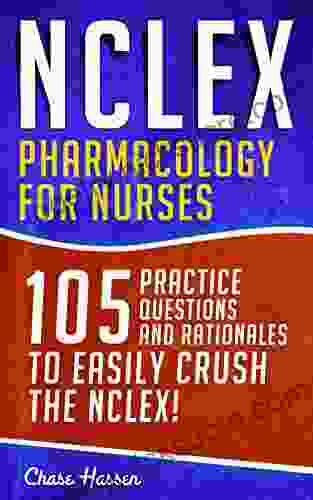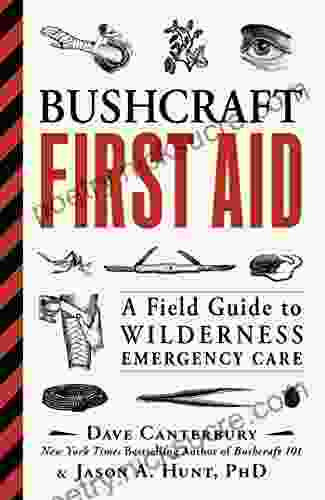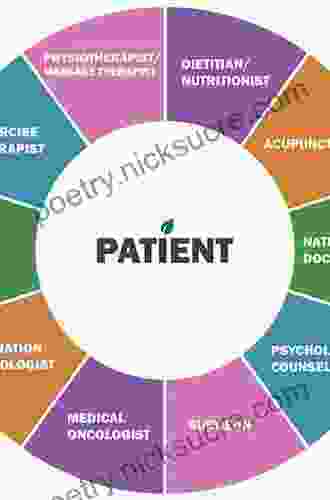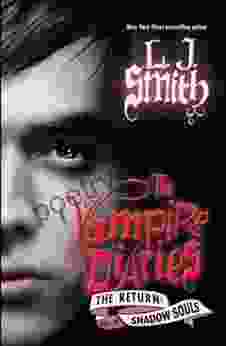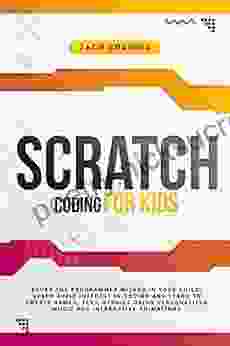105 Nursing Practice Questions Rationales To Easily Crush The NCLEX Nursing

4.4 out of 5
| Language | : | English |
| File size | : | 4989 KB |
| Text-to-Speech | : | Enabled |
| Screen Reader | : | Supported |
| Enhanced typesetting | : | Enabled |
| Print length | : | 217 pages |
| Lending | : | Enabled |
The NCLEX is a difficult exam, but it's not impossible to pass. With the right preparation, you can increase your chances of success. One of the best ways to prepare is to take practice questions. Practice questions help you identify your strengths and weaknesses, and they give you a chance to see what types of questions you can expect on the actual exam.
This article provides 105 nursing practice questions with rationales. These questions cover a variety of topics, including:
- Safe and effective care environment
- Health promotion and maintenance
- Psychosocial integrity
- Physiological integrity
Taking these practice questions will help you prepare for the NCLEX and increase your chances of success.
Safe and effective care environment
- Question: A patient is admitted to the hospital with a diagnosis of pneumonia. The nurse should assess the patient for which of the following?
Rationale: Pneumonia is a lower respiratory tract infection that can cause a variety of symptoms, including fever, chills, cough, and shortness of breath. The nurse should assess the patient for all of these symptoms, as well as for any other signs of infection, such as redness, swelling, or drainage. The nurse should also assess the patient's respiratory status, including their respiratory rate, depth, and effort.
- Question: A patient is taking a new medication that is known to cause drowsiness. The nurse should instruct the patient to do which of the following?
Rationale: Drowsiness is a common side effect of many medications. The nurse should instruct the patient to avoid activities that require alertness, such as driving or operating machinery, while taking the medication. The nurse should also instruct the patient to avoid alcohol, as alcohol can increase the sedative effects of the medication.
- Question: A patient is receiving a blood transfusion. The nurse should monitor the patient for which of the following?
Rationale: Blood transfusions can cause a variety of adverse reactions, including allergic reactions, hemolytic reactions, and transfusion-related acute lung injury (TRALI). The nurse should monitor the patient for any signs of an adverse reaction, such as rash, hives, itching, difficulty breathing, or chest pain. The nurse should also monitor the patient's vital signs, including their blood pressure, pulse, and temperature.
Health promotion and maintenance
- Question: A patient is at risk for developing a pressure ulcer. Which of the following interventions should the nurse implement?
Rationale: Pressure ulcers are caused by prolonged pressure on the skin. The nurse should implement interventions to reduce pressure on the patient's skin, such as turning the patient every 2 hours, using a pressure-relieving mattress, and avoiding placing pressure on the patient's skin. The nurse should also assess the patient's skin for any signs of redness, swelling, or drainage, and should report any changes to the healthcare provider.
- Question: A patient is being discharged from the hospital after a myocardial infarction. The nurse should teach the patient which of the following?
Rationale: Myocardial infarction is a heart attack. The nurse should teach the patient about the signs and symptoms of a heart attack, and about the importance of seeking medical attention immediately if they experience any of these symptoms. The nurse should also teach the patient about the importance of lifestyle modifications, such as eating a healthy diet, exercising regularly, and quitting smoking.
- Question: A patient is being referred to a smoking cessation program. The nurse should provide the patient with which of the following information?
Rationale: Smoking cessation programs can help patients quit smoking. The nurse should provide the patient with information about the program, including the dates and times of the meetings, the location of the meetings, and the cost of the program. The nurse should also answer any questions the patient may have about the program.
Psychosocial integrity
- Question: A patient is experiencing anxiety. Which of the following interventions should the nurse implement?
Rationale: Anxiety is a feeling of nervousness, worry, or fear. The nurse should implement interventions to help the patient manage their anxiety, such as providing reassurance, teaching relaxation techniques, and encouraging the patient to talk about their feelings. The nurse should also assess the patient for any underlying causes of anxiety, such as a medical condition or a stressful life event, and refer the patient to a mental health professional if necessary.
- Question: A patient is grieving the death of a loved one. Which of the following interventions should the nurse implement?
Rationale: Grief is a natural response to the loss of a loved one. The nurse should implement interventions to help the patient cope with their grief, such as providing support, listening to the patient talk about their feelings, and helping the patient to find resources for grief support. The nurse should also assess the patient for any signs of complicated grief, such as prolonged sadness, difficulty sleeping, or loss of appetite, and refer the patient to a mental health professional if necessary.
- Question: A patient is experiencing cultural barriers to care. Which of the following interventions should the nurse implement?
Rationale: Cultural barriers can interfere with a patient's ability to access and receive care. The nurse should implement interventions to overcome cultural barriers, such as using an interpreter, providing culturally sensitive care, and respecting the patient's cultural beliefs and values. The nurse should also assess the patient for any other factors that may be contributing to their difficulty accessing or receiving care, and refer the patient to appropriate resources if necessary.
Physiological integrity
- Question: A patient is experiencing shortness of breath. Which of the following interventions should the nurse implement?
Rationale: Shortness of breath can be caused by a variety of conditions, including heart failure, lung disease, and anemia. The nurse should assess the patient for any underlying causes of shortness of breath, and should implement interventions to relieve the patient's symptoms, such as providing oxygen, elevating the patient's head and shoulders, and encouraging the patient to rest. The nurse should also assess the patient for any signs of respiratory distress, such as cyanosis, wheezing, or stridor, and should report any changes to the healthcare provider.
- Question: A patient is experiencing pain. Which of the following interventions should the nurse implement?
Rationale: Pain is a subjective experience that can be caused by a variety of factors. The nurse should assess the patient's pain, including its location, intensity, and duration. The nurse should also assess the patient for any underlying causes of pain, such as an injury or a medical condition. The nurse should implement interventions to relieve the patient's pain, such as administering pain medication, applying heat or cold, or providing massage. The nurse should also assess the patient's response to pain medication, and should report any changes to the healthcare provider.
- Question: A patient is experiencing nausea and vomiting. Which of the following interventions should the nurse implement?
Rationale: Nausea and vomiting can be caused by a variety of conditions,
4.4 out of 5
| Language | : | English |
| File size | : | 4989 KB |
| Text-to-Speech | : | Enabled |
| Screen Reader | : | Supported |
| Enhanced typesetting | : | Enabled |
| Print length | : | 217 pages |
| Lending | : | Enabled |
Do you want to contribute by writing guest posts on this blog?
Please contact us and send us a resume of previous articles that you have written.
 Fiction
Fiction Non Fiction
Non Fiction Romance
Romance Mystery
Mystery Thriller
Thriller SciFi
SciFi Fantasy
Fantasy Horror
Horror Biography
Biography Selfhelp
Selfhelp Business
Business History
History Classics
Classics Poetry
Poetry Childrens
Childrens Young Adult
Young Adult Educational
Educational Cooking
Cooking Travel
Travel Lifestyle
Lifestyle Spirituality
Spirituality Health
Health Fitness
Fitness Technology
Technology Science
Science Arts
Arts Crafts
Crafts DIY
DIY Gardening
Gardening Petcare
Petcare Emily J Taylor
Emily J Taylor Clive Scarff
Clive Scarff Lori L Tharps
Lori L Tharps Charles J Sanders
Charles J Sanders Julie Creffield
Julie Creffield Luke Schumacher
Luke Schumacher Morton Manus
Morton Manus Chase Hassen
Chase Hassen The Pinnacle Review
The Pinnacle Review Aaron Mahnke
Aaron Mahnke Zena Hitz
Zena Hitz Annette Burns
Annette Burns Kristina Cowan
Kristina Cowan Jennifer Dugan
Jennifer Dugan Neel Doshi
Neel Doshi Maya Van Wagenen
Maya Van Wagenen Susan Straub
Susan Straub College Hippo
College Hippo H Jerome Chapman
H Jerome Chapman Steve Newell
Steve Newell Graham Robb
Graham Robb Heidi Kreider
Heidi Kreider James C Zimring
James C Zimring Asker Jeukendrup
Asker Jeukendrup Ann Marie Brown
Ann Marie Brown E R Truitt
E R Truitt Justine Gregory Williams
Justine Gregory Williams Steve Schwartz
Steve Schwartz Victor Stringer
Victor Stringer Sara Dyer
Sara Dyer Caroline Miller
Caroline Miller Kristen L Mauk
Kristen L Mauk Bren Smith
Bren Smith Steve Olson
Steve Olson Daniel Isberner
Daniel Isberner Fumio Sasaki
Fumio Sasaki Crystal Cook
Crystal Cook Anna Bright
Anna Bright Robin Esrock
Robin Esrock Steve Bowkett
Steve Bowkett Susan G Solomon
Susan G Solomon Lily Siou
Lily Siou Joe Hyams
Joe Hyams Naomi Tomky
Naomi Tomky Susan Spicer
Susan Spicer Anne Sylvie Malbrancke
Anne Sylvie Malbrancke Silvia M Lindtner
Silvia M Lindtner Maggie Downs
Maggie Downs Margaret Jean Langstaff
Margaret Jean Langstaff Martin N Seif
Martin N Seif Marie Cirano
Marie Cirano Jacqueline Winslow
Jacqueline Winslow Michael G Manning
Michael G Manning Anna Della Subin
Anna Della Subin Jay Allan
Jay Allan Sukhveer Singh
Sukhveer Singh Suzanne Clark
Suzanne Clark Melissa Mortenson
Melissa Mortenson Zach Davis
Zach Davis Glen E Clarke
Glen E Clarke Sandy Bodeau
Sandy Bodeau Tim Cahill
Tim Cahill Jennifer Kostick
Jennifer Kostick Quinn Loftis
Quinn Loftis Christopher Seddon
Christopher Seddon Reinhard Kleist
Reinhard Kleist John Baichtal
John Baichtal Kathy Morey
Kathy Morey Barbara Sealock
Barbara Sealock Stacey Williams
Stacey Williams Pradeepa Narayanaswamy
Pradeepa Narayanaswamy Josephine Mccarthy
Josephine Mccarthy Richard Mcafee
Richard Mcafee Paul Bloom
Paul Bloom Sean Purchase
Sean Purchase L Chapman
L Chapman Sally Annjanece Stevens
Sally Annjanece Stevens Illustrated Edition Kindle Edition
Illustrated Edition Kindle Edition Helge Kragh
Helge Kragh Timothy P Schultz
Timothy P Schultz Sean Bartram
Sean Bartram Gill James
Gill James Hill Harper
Hill Harper Linda K Miller
Linda K Miller Anna B Doe
Anna B Doe Chic Scott
Chic Scott Kass Morgan
Kass Morgan Ellen Painter Dollar
Ellen Painter Dollar Sparknotes
Sparknotes Sarah Stodola
Sarah Stodola Lizzie Collingham
Lizzie Collingham Timothy Ellis
Timothy Ellis Sheela Raja
Sheela Raja Bert Mendelson
Bert Mendelson Linda Lewis Alexander
Linda Lewis Alexander Anna Ivey
Anna Ivey Peter Richmond
Peter Richmond Jay Spence
Jay Spence Ariel Dalfen
Ariel Dalfen Steven A Fino
Steven A Fino Roy M Wallack
Roy M Wallack Dana James
Dana James Pawel Malczewski
Pawel Malczewski Scott Allan
Scott Allan Annabel Streets
Annabel Streets Walter Mischel
Walter Mischel Daphne Poltz
Daphne Poltz W W Sawyer
W W Sawyer Richard Appleton
Richard Appleton Steven G Krantz
Steven G Krantz Barry Dainton
Barry Dainton Howard Means
Howard Means Lina Beard
Lina Beard Miley Smiley
Miley Smiley James F Twyman
James F Twyman Joanna Wells
Joanna Wells Darcie Little Badger
Darcie Little Badger Lisa Manterfield
Lisa Manterfield Annalyn Ng
Annalyn Ng James P Sethna
James P Sethna John Pullen
John Pullen Lily Dunn
Lily Dunn Malcolm S Thaler
Malcolm S Thaler Curtis Collins
Curtis Collins Chris Bailey
Chris Bailey Monroe Wildrose
Monroe Wildrose Randy J Paterson
Randy J Paterson John Gignilliat
John Gignilliat Cb Droege
Cb Droege Tony Osgood
Tony Osgood Barb Musick
Barb Musick Hanumant Deshmukh
Hanumant Deshmukh Suzanne Girard Eberle
Suzanne Girard Eberle Eddie Jones
Eddie Jones John Van Wyhe
John Van Wyhe Will Kurt
Will Kurt John Murray
John Murray Dean Buonomano
Dean Buonomano Peyton Curley
Peyton Curley Michael Witwer
Michael Witwer Anna Flores Locke
Anna Flores Locke William P Young
William P Young Louise Katz
Louise Katz Lisa Randall
Lisa Randall Guy Windsor
Guy Windsor Kendall Coyne
Kendall Coyne Jean Barbre
Jean Barbre Ruby Mcconnell
Ruby Mcconnell Christelle Dabos
Christelle Dabos Finn Aagaard
Finn Aagaard Rick Sparkman
Rick Sparkman Katie Krimer Ma Lcsw
Katie Krimer Ma Lcsw Jessa Stone
Jessa Stone Dave Hughes
Dave Hughes M Shawn Copeland
M Shawn Copeland Harley Mcallister
Harley Mcallister Eric Greitens
Eric Greitens Paulo Guillobel
Paulo Guillobel Arcturus Publishing
Arcturus Publishing John Dickson
John Dickson Buddy Lee
Buddy Lee Louis Van Dyke
Louis Van Dyke Fox Fisher
Fox Fisher Elisabeth Haich
Elisabeth Haich Cade Courtley
Cade Courtley Laurie Varga
Laurie Varga Sandy Camillo
Sandy Camillo Robert F Boszhardt
Robert F Boszhardt Margaret Rogerson
Margaret Rogerson Joshua Shifrin
Joshua Shifrin Scott Shupe
Scott Shupe Wendy Leo Smith
Wendy Leo Smith Steve Bennett
Steve Bennett Tim Young
Tim Young Creative Guy
Creative Guy Stephanie Cave
Stephanie Cave J Scott Long
J Scott Long Kalman Samuels
Kalman Samuels Sharman Apt Russell
Sharman Apt Russell Kyung Won Chung
Kyung Won Chung Barak A Bassman
Barak A Bassman Damian Hall
Damian Hall Marjorie Savage
Marjorie Savage M Terese Verklan
M Terese Verklan John Yates
John Yates Jason
Jason Mary E Pearson
Mary E Pearson Nelson Dellis
Nelson Dellis Cathy Glass
Cathy Glass Scott P Sells
Scott P Sells Joy Dawson
Joy Dawson Stephen J Pyne
Stephen J Pyne Kennedy Achille
Kennedy Achille Danny Jones
Danny Jones Genevieve Mckay
Genevieve Mckay Jay Young
Jay Young Larry Thornberry
Larry Thornberry Stefan Hollos
Stefan Hollos Anna Wood
Anna Wood Christine Field
Christine Field Chris Gore
Chris Gore Skeleton Steve
Skeleton Steve C W Farnsworth
C W Farnsworth Robert A Cook
Robert A Cook Tanmay Mehta
Tanmay Mehta Dave Hall
Dave Hall Bob Labbe
Bob Labbe Karen Bassie Sweet
Karen Bassie Sweet Adil E Shamoo
Adil E Shamoo Trevor Hartman
Trevor Hartman Breeda Bermingham
Breeda Bermingham R K Agarwal
R K Agarwal Joyce Meyer
Joyce Meyer Katharine Beals
Katharine Beals Michael Burnett
Michael Burnett Lexi Ryan
Lexi Ryan Charles Dickens
Charles Dickens Sean Covey
Sean Covey Worley Faver
Worley Faver Randall Fitzgerald
Randall Fitzgerald James C Scott
James C Scott Robby Weber
Robby Weber Nicholas Clapp
Nicholas Clapp Ichigo Takano
Ichigo Takano Elizabeth Wissner Gross
Elizabeth Wissner Gross Zach Hunter
Zach Hunter Ray Moynihan
Ray Moynihan Chris Fregly
Chris Fregly Angela Saini
Angela Saini Philip Gibson
Philip Gibson Winton Porter
Winton Porter Gwen Mckee
Gwen Mckee Larry Semento
Larry Semento George Lakoff
George Lakoff Jonathan Franklin
Jonathan Franklin Dan Gardner
Dan Gardner J E Esslemont
J E Esslemont Jennifer L Lopez
Jennifer L Lopez Becky Wade
Becky Wade Richard A Ruth
Richard A Ruth Matthew Cobb
Matthew Cobb Nisha Garg
Nisha Garg Adele Faber
Adele Faber Sam Demas
Sam Demas Robert Gerver
Robert Gerver Rutger Bregman
Rutger Bregman Harnarayan Singh
Harnarayan Singh Julie C Meloni
Julie C Meloni Rebecca A Moyes
Rebecca A Moyes Anna Lowenhaupt Tsing
Anna Lowenhaupt Tsing Anna Grafl
Anna Grafl Michael F Nenes
Michael F Nenes Todd Denault
Todd Denault Noel D Justice
Noel D Justice Anna Watson
Anna Watson Les Livingstone
Les Livingstone Jackson Carter
Jackson Carter Gloria Chadwick
Gloria Chadwick John Edwards
John Edwards Mordecai Orimiladeye
Mordecai Orimiladeye Dr Sarita Uhr
Dr Sarita Uhr Suzanne I Barchers
Suzanne I Barchers Holly Chism
Holly Chism Jonathan Pd Buckley
Jonathan Pd Buckley Jack Perconte
Jack Perconte Ling Seto
Ling Seto Bella Forrest
Bella Forrest Ann Voskamp
Ann Voskamp Dave Canterbury
Dave Canterbury Mark Matlock
Mark Matlock Gemma Bray
Gemma Bray H M Schey
H M Schey Michael Labossiere
Michael Labossiere Geoff Greig
Geoff Greig Junior Health Institute
Junior Health Institute William Goldman
William Goldman Jonathan R Brennan
Jonathan R Brennan Harold Davis
Harold Davis Ken Robinson
Ken Robinson Good Books
Good Books Hope Comerford
Hope Comerford Vladimir Vasiliev
Vladimir Vasiliev Zach Codings
Zach Codings Jenny Jacobs
Jenny Jacobs Bob Madgic
Bob Madgic Bernard Stiegler
Bernard Stiegler Tali Sharot
Tali Sharot Margaret Paul
Margaret Paul Charlene Beswick
Charlene Beswick Roger Hall
Roger Hall Ford R Bryan
Ford R Bryan June Hur
June Hur Livia Bitton Jackson
Livia Bitton Jackson Matthew Rudy
Matthew Rudy Joey Myers
Joey Myers Philip Reed
Philip Reed Prime Hall
Prime Hall Dan Koboldt
Dan Koboldt Ray Eye
Ray Eye Roy R Grinker
Roy R Grinker Richard C Schwartz
Richard C Schwartz Melanie Dickerson
Melanie Dickerson Jenna Evans Welch
Jenna Evans Welch Holly Bourne
Holly Bourne Anna Crowley Redding
Anna Crowley Redding L J Smith
L J Smith Julian Havil
Julian Havil Stefanie Japel
Stefanie Japel Rick Page
Rick Page Stephen Tarsitano
Stephen Tarsitano Sharon Rowley
Sharon Rowley Craig Ramsay
Craig Ramsay Julie A Ross
Julie A Ross Richard A Swanson
Richard A Swanson Sajni Patel
Sajni Patel Ben Shneiderman
Ben Shneiderman Mark Mckinney
Mark Mckinney Jemar Tisby
Jemar Tisby David Woods
David Woods Horace Freeland Judson
Horace Freeland Judson Peter Watson
Peter Watson Seth Stephens Davidowitz
Seth Stephens Davidowitz Julie Plagens
Julie Plagens Valerie Hansen
Valerie Hansen Zoe Moore
Zoe Moore Henry Dillon
Henry Dillon Sara Wickham
Sara Wickham Ellen Dugan
Ellen Dugan Dante Fortson
Dante Fortson Stan Gibilisco
Stan Gibilisco Ann Zaprazny
Ann Zaprazny Dannah Gresh
Dannah Gresh Judy Corry
Judy Corry Bob Cary
Bob Cary Horace Kephart
Horace Kephart David Berry
David Berry Todd Radom
Todd Radom Alexander L Chapman
Alexander L Chapman Omari Bouknight
Omari Bouknight Eleanor J Sullivan
Eleanor J Sullivan Tarani Chandola
Tarani Chandola George James Grinnell
George James Grinnell Alex Bromley
Alex Bromley Robert A Conover
Robert A Conover James Burke
James Burke Steve Oldenburg
Steve Oldenburg Susan M Schneider
Susan M Schneider Ian Moulding
Ian Moulding Julia Galef
Julia Galef Tyler Richards
Tyler Richards Mike Reilly
Mike Reilly Anna Quindlen
Anna Quindlen Kate Mcvaugh
Kate Mcvaugh Dan Vogel
Dan Vogel Christopher T Coughlin
Christopher T Coughlin John O Sullivan
John O Sullivan Douglas Perry
Douglas Perry Helen E Lees
Helen E Lees Stuart Tomlinson
Stuart Tomlinson Matthew Locricchio
Matthew Locricchio Gilbert J Grant Md
Gilbert J Grant Md Bethany Saltman
Bethany Saltman Christine Hopfgarten
Christine Hopfgarten Nicholas Thomas
Nicholas Thomas Ann Valett
Ann Valett Krista Marson
Krista Marson Brian Daccord
Brian Daccord G Norman Lippert
G Norman Lippert Stacey A Shannon
Stacey A Shannon L A Cotton
L A Cotton John Dunn
John Dunn Isaac Fitzsimons
Isaac Fitzsimons Shawn Shallow
Shawn Shallow Michael Hodgson
Michael Hodgson Sally Black
Sally Black Jackie Bolen
Jackie Bolen Dr Harper
Dr Harper Johnny Chuong
Johnny Chuong Hannah Testa
Hannah Testa L J Martin
L J Martin Jill Lepore
Jill Lepore Mikael Lindnord
Mikael Lindnord Frank Thomas
Frank Thomas Jenn Bennett
Jenn Bennett Chronicle Books
Chronicle Books Dave Whitlock
Dave Whitlock Nancy Marie White
Nancy Marie White Helen Adrienne
Helen Adrienne Peter Wacht
Peter Wacht Annaka Harris
Annaka Harris Frances Schultz
Frances Schultz Neal Shusterman
Neal Shusterman Kristian Berg
Kristian Berg Emmett W Hines
Emmett W Hines R A Salvatore
R A Salvatore Patricia Ladis
Patricia Ladis P M Gilbert
P M Gilbert Thomas A Garrity
Thomas A Garrity Steve Grant
Steve Grant Freddy Silva
Freddy Silva Sherry B Ortner
Sherry B Ortner Rebecca Carroll
Rebecca Carroll Caryl Phillips
Caryl Phillips Illysa R Foster
Illysa R Foster Vittal S Anantatmula
Vittal S Anantatmula Pierluigi Barrotta
Pierluigi Barrotta Gary Chapman
Gary Chapman Paul Logothetis
Paul Logothetis Steven Callahan
Steven Callahan Janine Marsh
Janine Marsh Julian Of Norwich
Julian Of Norwich Ralph Cockburn
Ralph Cockburn Patrick Torsell
Patrick Torsell Michael Tan
Michael Tan Melvin Fitting
Melvin Fitting Donna D Ignatavicius
Donna D Ignatavicius Ann Mccallum Staats
Ann Mccallum Staats Barry Schwartz
Barry Schwartz Dorothy Ours
Dorothy Ours Jacob Ward
Jacob Ward Peter L Falkingham
Peter L Falkingham Oskar Morgenstern
Oskar Morgenstern C J Brown
C J Brown Shelley Emling
Shelley Emling Marva Boatman
Marva Boatman Lane Demas
Lane Demas Geryn Childress
Geryn Childress Martin Meredith
Martin Meredith Bruce Lockwood
Bruce Lockwood Antonio Robert
Antonio Robert Sally Connolly
Sally Connolly Boye Lafayette De Mente
Boye Lafayette De Mente Mishka Shubaly
Mishka Shubaly Ralph Waldo Emerson
Ralph Waldo Emerson Claire Walter
Claire Walter Patricia Romanowski Bashe
Patricia Romanowski Bashe Mike Roberts
Mike Roberts Shannon Vallor
Shannon Vallor Steven Munatones
Steven Munatones Paul Mendelson
Paul Mendelson Steven Yellin
Steven Yellin David Soucie
David Soucie Darryl Belfry
Darryl Belfry Jeff Kuehl
Jeff Kuehl Earl Hipp
Earl Hipp Christina Henry De Tessan
Christina Henry De Tessan Wayne C Booth
Wayne C Booth Peter Hathaway Capstick
Peter Hathaway Capstick Carl Mckeating
Carl Mckeating Tara Haelle
Tara Haelle
Light bulbAdvertise smarter! Our strategic ad space ensures maximum exposure. Reserve your spot today!
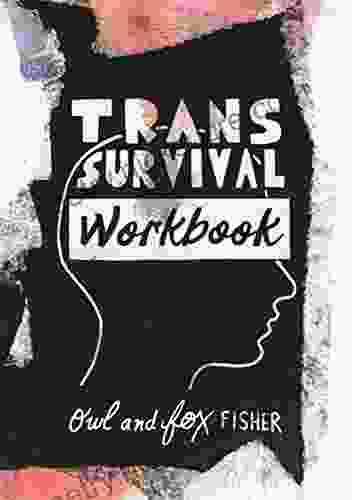
 Yasunari KawabataThe Trans Survival Workbook: A Guide to Living and Thriving as a Transgender...
Yasunari KawabataThe Trans Survival Workbook: A Guide to Living and Thriving as a Transgender...
 Samuel Taylor ColeridgeHarley Merlin and the Stolen Magicals: A Spellbinding Adventure Through a...
Samuel Taylor ColeridgeHarley Merlin and the Stolen Magicals: A Spellbinding Adventure Through a... Davion PowellFollow ·18.5k
Davion PowellFollow ·18.5k Eric NelsonFollow ·2.5k
Eric NelsonFollow ·2.5k Craig BlairFollow ·10.6k
Craig BlairFollow ·10.6k Troy SimmonsFollow ·3.7k
Troy SimmonsFollow ·3.7k Derek BellFollow ·13.7k
Derek BellFollow ·13.7k Thomas PowellFollow ·6.6k
Thomas PowellFollow ·6.6k Joel MitchellFollow ·11.2k
Joel MitchellFollow ·11.2k Brayden ReedFollow ·19.4k
Brayden ReedFollow ·19.4k

 Aldous Huxley
Aldous HuxleyMorgenstern: A Classic Tale of True Love and High...
Morgenstern is a...
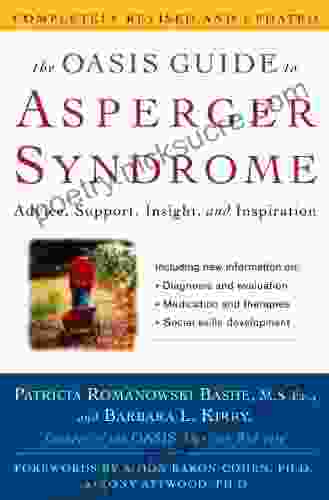
 Beau Carter
Beau CarterThe Oasis Guide to Asperger Syndrome
What is Asperger Syndrome? Asperger...
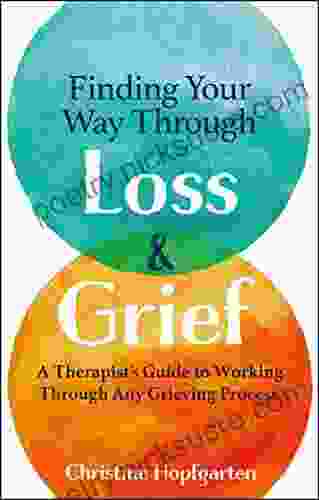
 Chadwick Powell
Chadwick PowellFinding Your Way Through Loss Grief: A Therapist S Guide...
Grief is a natural human emotion that we...
4.4 out of 5
| Language | : | English |
| File size | : | 4989 KB |
| Text-to-Speech | : | Enabled |
| Screen Reader | : | Supported |
| Enhanced typesetting | : | Enabled |
| Print length | : | 217 pages |
| Lending | : | Enabled |


